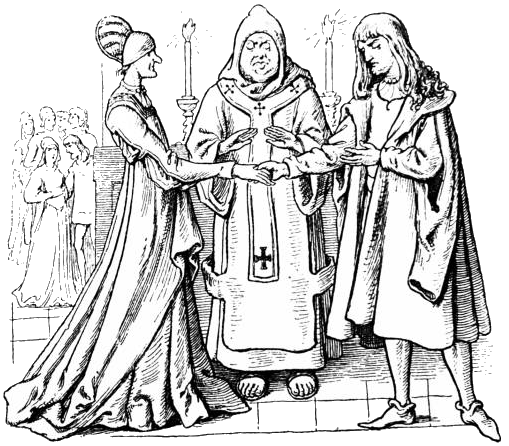Wedding vows
Who wrote the first wedding vows?
The exact origins of wedding vows as a formal part of wedding ceremonies remain unclear. They likely began as simple promises exchanged between couples, evolving over time to incorporate religious and cultural elements.

In medieval Christian ceremonies, vows became formalized, emphasizing commitment and fidelity. However, you won't find any specific set of these vows in the Bible. Weddings, yes (see for example John 2) but formal wedding vows as we know them today aren’t explicitly detailed.
However, the Bible does offer moral principles and teachings related to marriage which have kept mankind's continuity for millennia. Yes, the Bible is indeed an awesome book!
Beginning in the 11th century, the Sarum Rites included vows which emphasized the sacramental nature of marriage. They also enabled the couple to express their consent to marry each other, promise life-long fidelity, and ask God for his blessing on their union. The vows were undoubtedly based on Scripture, but the liturgical texts likely varied across different cultural and geographical regions.
Nevertheless, here's an example:
In the 16th century, the Church began to formalize wedding vows in the first Book of Common Prayer, laying the groundwork for the vows we use today.
The Church of England still uses vows from the (later) Book of Common Prayer (1662) but most weddings today use more contemporary language found in The Marriage Service from Common Worship (2000), as shown on the English vows page
Non-English wedding vows
In addition to English wedding vows, these pages offer English translation for vows in many different languages. Whilst some of these may be quite exotic, we advise against using them simply to make your wedding sound cool.
Exchanging vows in a language that your guests don't understand should be approached with caution, as those guests are important witnesses to the commitments you make.
Klingon, Latin, Esperanto, or any other fancy language, offers no advantage over vows expressed in words that you, your partner, your families and friends can fully understand.
...and finally, nomenclature
We've been asked: "Should we say 'wedding vows' or 'marriage vows'?
Our answer: The terms are largely synonymous, but they can carry slightly different connotations. "Wedding vows" refer specifically to those made during the wedding ceremony, whereas "marriage vows" can encompass the ongoing promises and continuous commitments that extend beyond the wedding ceremony itself.
Whatever you prefer to call them, make sure you keep them!

Ephesians 5:22-33 about requirements for the married couple to love, respect and submit to each other.
Malachi 2:14 espouses a covenantal relationship, not only with each other, but also with God.
Genesis 2:24 point to monogamous unity and faithful commitment for a married couple, echoed in Exodus 20:14 and Hebrews 13:4 condemning adultery.
| privacy policy | © seiyaku |